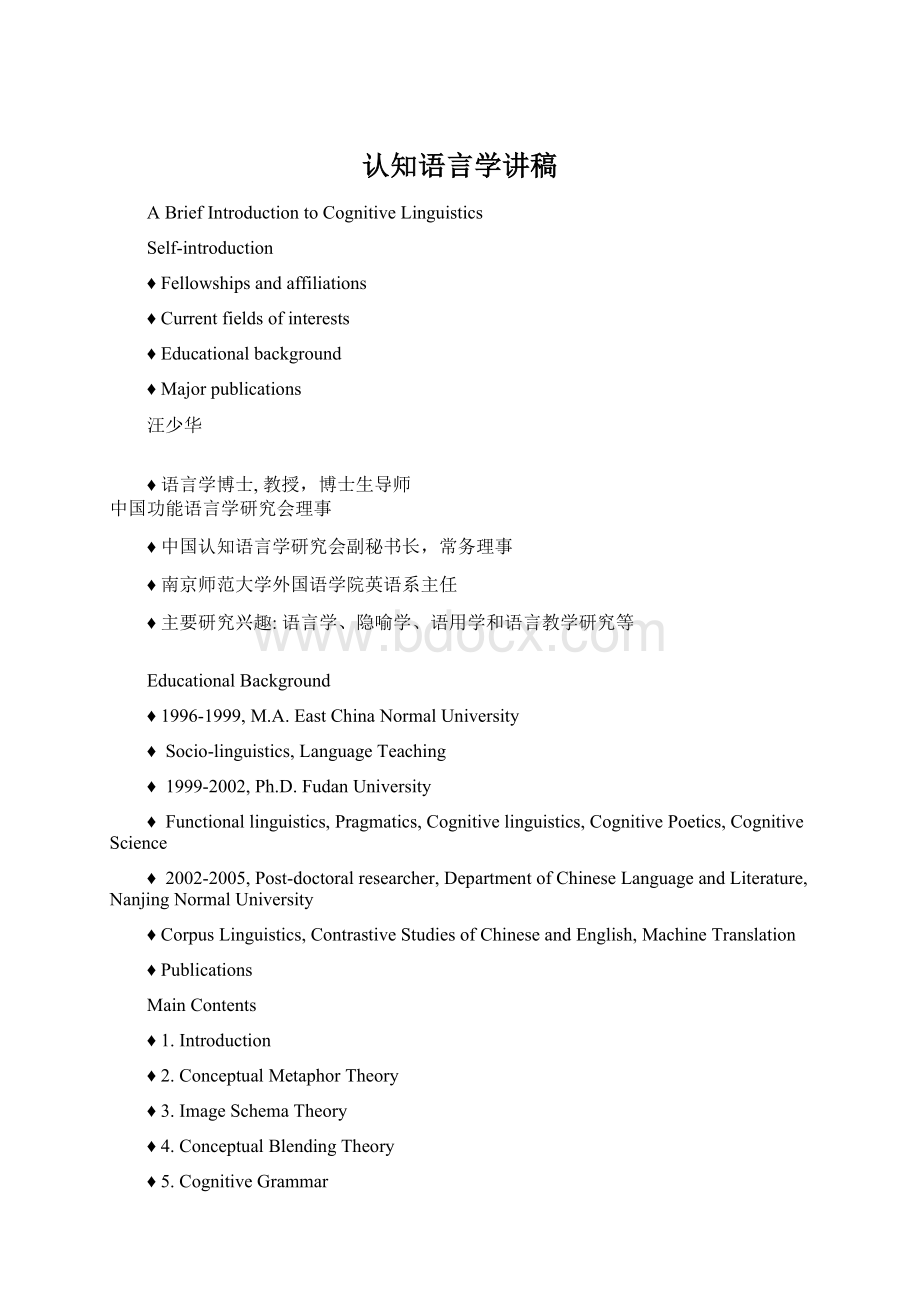认知语言学讲稿.docx
《认知语言学讲稿.docx》由会员分享,可在线阅读,更多相关《认知语言学讲稿.docx(32页珍藏版)》请在冰豆网上搜索。

认知语言学讲稿
ABriefIntroductiontoCognitiveLinguistics
Self-introduction
♦Fellowshipsandaffiliations
♦Currentfieldsofinterests
♦Educationalbackground
♦Majorpublications
汪少华
♦语言学博士,教授,博士生导师
中国功能语言学研究会理事
♦中国认知语言学研究会副秘书长,常务理事
♦南京师范大学外国语学院英语系主任
♦主要研究兴趣:
语言学、隐喻学、语用学和语言教学研究等
EducationalBackground
♦1996-1999,M.A.EastChinaNormalUniversity
♦Socio-linguistics,LanguageTeaching
♦ 1999-2002,Ph.D.FudanUniversity
♦Functionallinguistics,Pragmatics,Cognitivelinguistics,CognitivePoetics,CognitiveScience
♦ 2002-2005,Post-doctoralresearcher,DepartmentofChineseLanguageandLiterature,NanjingNormalUniversity
♦CorpusLinguistics,ContrastiveStudiesofChineseandEnglish,MachineTranslation
♦Publications
MainContents
♦1.Introduction
♦2.ConceptualMetaphorTheory
♦3.ImageSchemaTheory
♦4.ConceptualBlendingTheory
♦5.CognitiveGrammar
SomeAssumptions
♦1. Cognitivesemanticsisnosodifficultasitsounds.
♦Metaphorsweliveby
♦Blendingisthewaywethink.
♦2. Thisisasurveyofsurvey—briefintroductiontoCMT,CBT,CG,IST,PTT
♦3. SinceCSisanewdiscipline,mostofthequestionsareopen.Everyonecancontributealittletoitinsomewayorother.
♦4. Abirdinthehandisworththantwointhebush.
5. Interactiveprocess:
wemaydiscusssomeproblemstogetherviamyemail(addresss:
wshdaniel@)
♦
MajorReferences
Evaluation(TermPaper)
Metaphormania
♦Metaphoristhehallmarkofgenius.
Scholars:
GeorgeLakoff,GillesFauconnier,MarkTurner,MarkJohnson,RonaldW.Langacker,JohnTaylor,etc.
Lectures
Conferences
ScopeofCognitiveLinguistics
1. Whatissemantics?
⏹Definition:
Semanticsisthescientificstudyofmeaninginlanguage.
2. Differentapproachestosemantics
1) Philosophy
⏹Austin:
Performativesandspeechacts
⏹Strawson:
presupposition
⏹Grice:
implicature
2) Logic:
truth-conditionsemantics
3) Anthropology
⏹Malinowski:
theoryofcontextofsituation
⏹Kinshipsemantics:
componentialanalysis
4) Psychology:
Howweprocesslanguageinitsproductionandreception
⏹Behavourism:
stimulus-response
⏹Mentalism:
interpretivesemantics;generativesemantics
⏹Examples:
3.Cognitivescience
⏹Cognitivescience:
Cognitivescienceisthescientificdisciplinethatstudiesconceptualsystems.Itisarelativelynewdiscipline,havingbeenfoundedinthe1970s.
4.Theterm“Cognitive”
⏹Cognitive:
Incognitivescience,thetermcognitiveisusedforanykindofmentaloperationorstructurethatcanbestudiedinpreciseterms.Allaspectsofthoughtandlanguage,consciousorunconscious,arecognitive.
5.First-generationcognitivescience
⏹First-generationcognitivescienceevolvedinthe1950sand1960s,centeringonideasaboutsymboliccomputation.Itacceptedwithoutquestiontheprevailingviewthatreasonwasdisembodiedandliteral__asinformallogicorthemanipulationofasystemofsigns.
6.Second-generationcognitivescience
⏹Itisfoundedinthe1970s.
⏹Itfocusesonunconsciousconceptualsystems.
7.Cognitivelinguistics
⏹Cognitivelinguistics
⏹Definition:
Cognitivelinguisticsisalinguistictheorythatseekstousethediscoveriesofsecond-generationcognitivesciencetoexplainasmuchoflanguageaspossible.
8.AssumptionofCognitiveLinguistics
⏹Conceptsareneuralstructuresthatallowustomentallycharacterizeourcategoriesandreasonaboutit.Anembodiedconceptisaneuralstructurethatisactuallypartof,ormakesuseof,thesensorimotorsystemofourbrain.Muchofconceptualinferenceis,therefore,sensorimotorinference.
⏹Languageisoneofourmostimportantwindowsintotheworkingsofthemind.Itisnottheonlywindow,butitisthesourceofavastmajorityoftheevidenceaboutcognition.
⏹Thegrammarofalanguageconsistsofthehighlystructuredneuralconnectionslinkingtheconceptualandexpressive(phonological)aspectsofthebrain.
9. Whatiscognitivesemantics?
⏹Definition:
cognitivesemanticsstudieshumanconceptualsystems,meaning,andinference.Inshort,itstudieshumanreason.
10.Themostbasicresults:
⏹Conceptsarisesfrom,andareunderstoodthrough,thebody,thebrain,andtheexperienceintheworld.
⏹Conceptscruciallymakeuseofimaginativeaspectsofmind:
frames,metaphor,metonymy,prototypes,radialcategories,mentalspaces,andconceptualblending.Abstractconceptsariseviametaphoricalprojectionsfrommoredirectlyembodiedconcepts(e.g.,perceptualandmotorconcepts).
⏹Suchembodiedmechanismsofconceptualizationandthoughtarehiddenfromourconsciousness,buttheystructureourexperienceandareconstitutiveofwhatwedoconsciouslyexperience.
11.Traditionalfalseassumptions
❿Alleverydayconventionallanguageisliteral,andnoneismetaphorical.
❿Allsubjectmattercanbecomprehendedliterally,withoutmetaphor.
❿Onlyliterallanguagecanbecontingentlytrueorfalse.
❿Alldefinitionsgiveninthelexiconofalanguageareliteral,notmetaphorical.
❿Theconceptsusedinthegrammarofalanguageareallliteral;nonearemetaphorical.
Theevidencefortheexistenceofasystemofconventionalconceptualmetaphorsisoffivetypes:
⏹-Generalizationsgoverningpolysemy,thatis,theuseofwordswithanumberofrelatedmeanings.
⏹-Generalizationsgoverninginferencepatterns,thatis,caseswhereapatternofinferencesfromoneconceptualdomainisusedinanotherdomain.
⏹-Generalizationsgoverningnovelmetaphoricallanguage(see,Lakoff&Turner,1989).
⏹-Generalizationsgoverningpatternsofsemanticchange(see,Sweetser,1990).
⏹-Psycholinguisticexperiments(see,Gibbs,1990,thisvolume).
⏹Cognitivelinguistics(CL):
anintroduction
⏹Prototypesandcategories
⏹Levelsofcategorization
⏹Frames
⏹Figureandground
⏹Conceptualmetaphorsandmetonymies
⏹OtherissuesinCL
12.CognitiveLinguistics:
anIntroduction
⏹WhatisCLandwheredoesitfitin?
⏹Thetermcognitive:
⏹‚Cognitivemeansrelatingtothementalprocessinvolvedinknowing,learning,andunderstandingthings.‘(COBUILD)
⏹Inthatmanymodernlinguistsrecognizethatlanguageknowledgeresidesinthemindsofspeakerstheymightbesaidtopractice‚cognitive‘linguistics
⏹Chomskyanlinguisticsas‚cognitivelinguistics‘andthe‚cognitiveturn‘inlinguistics
⏹SyntacticStructures(Chomsky1957),AspectsoftheTheoryofSyntax(Chomsky1965):
grammarexistsinspeakers‘minds;innateUG;languageasautonomouscomponentofthemind:
knowledgeoflanguageformsanautonomousmodule/facultyindependentofothermentalprocesses
⏹CognitiveLinguistics:
definitionsanddescriptions
⏹„[A]descriptivelabelforaratherbroadmovementwithinmodernlinguistics.Itincludesavarietyofapproaches,methodologies,andemphases,whichare,however,unifiedbyanumberofcommonassumptions.Foremostamongtheseisthebeliefthatlanguageformsanintegralpartofhumancognition,andthatanyinsightfulanalysisoflinguisticphenomenawillneedtobeembeddedinwhatisknownabouthumancognitiveabilities.“(Taylor2002:
3f.)
⏹„Cognitivelinguistics[…]isanapproachtolanguagethatisbasedonourexperienceoftheworldandthewayweperceiveandconceptualizeit.“(Ungerer&Schmid1996:
x)
⏹InCLresearchisshapedfromtheoutsetbywhatisbelievedtobecognitivelyplausible.Languageasanintegralpartofcognition:
studyoflanguageinlightofwhatisknownaboutthemind(experimentation,introspection,common-senseobservation)
⏹„CognitiveLinguistsstudymuchthesamekindofthingsasanyotherlinguist–syntax,morphology,phonology,wordmeaning,discoursestructure[…].ButthegeneralthrustoftheCognitiveLinguisticsenterpriseistorendertheseaccountsconsonantwithaspectsofcognitionwhicharewelldocumentedorself-evident,oratleasthighlyplausible,andwhichmaywellbemanifestedinnon-linguisticactivities.“(Taylor2002:
9)
⏹Threemain‘topics’/approaches:
experientialism,prominence,attention
1.Experientialism(vsobjectivism)
Experientialismrejectsthebasicbeliefofobjectivismthatcategoriesexistinobjectivereality,togetherwiththeirpropertiesandrelations,independentlyofourconsciousness.Symbolsoflanguagearemeaningfulbecausetheyareassociatedwiththeseobjectivecategories.Threedoctrinesofobjectivismthatarerefuted:
•Thedoctrineoftruth-conditionalmeaning:
Meaningisbasedonreference+truth
•The‘correspondence’theoryoftruth:
Truthconsistsinthecorrespondencebetweensymbolsandstates-of-affairsintheworld
•Thedoctrineofobjectivereference:
thereisan‘objectivelycorrect’waytoassociatesymbolswiththingsintheworld.
Instead,experientialismsuggeststhat“ourbodilyexperienceandthewayweuseimaginativemechanismsarecentraltohowweconstructcategoriestomakesenseofexperience.”(Lakoff1987:
xii)
2.Prominence:
selectionandarrangementofinformation
3.Attention:
whichaspectofaneventattractsattention
WhystudyCL?
⏹1)oneofthemostrecentapproacheswithinlinguistics,
⏹2)unifiedcognitiveexplanationoflanguage,
⏹3)applicabletoTEFL
ThirtyyearsofCL
threelandmarksinthehistoryofCL
⏹1975-1977
theearlybeginnings:
Talmy1975onfigure/ground
Langacker1976onCognitiveGrammar
Lakoff1977on‘gestalt’models
ThirtyyearsofCL
threelandmarksinthehistoryofCL
⏹1987-1989
enteringtheinternationalscene:
1987Langacker:
FoundationsofCognitiveGrammar
1987Lakoff:
Women,Fire&DangerousThings
1988Rudzka-Ostyn(ed.),TopicsinCL
19891stIntlCognitiveLinguisticsConference
1989launchingCognitiveLinguistics,thejournal
ThirtyyearsofCL
threel